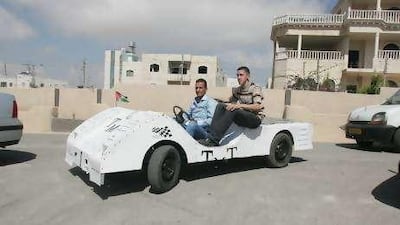HEBRON // It looks like a cross between a jeep and a go-cart, with a sticker-covered front bonnet that brings to mind Formula One. And what it lacks in power, it makes up for by sheer innovation, not to mention its ability to cause people to stop and stare.
This is the TMT1, the first fully functioning solar-powered Palestinian car, which at full speed can reach 30kph for 100 minutes before its bank of 12 batteries need recharging. At half speed, the car, which is powered by four 70-watt solar panels, can run for as long as three to five hours, according to Monjed Shweiki, 22, one of three engineering students at the Palestinian Polytechnic University (PPU) in Hebron behind the car.
In spite of their success, the TMT1 looks to be the first and last solar powered car out of Hebron for the foreseeable future. With little investor confidence, a political situation that remains highly combustible, an occupation that shows no sign of ending and no means of promoting or commercialising the car, dreams of solar-powered transportation in Hebron and beyond are likely to remain just that.
"If we get funding, and the PPU wanted to take this further, we all would," said Mr Shweiki, for whom the TMT1 was a graduation project. "As it is, I need to get a job and earn some money." The car was the brainchild of Mr Shweiki, Thabet Shawa and Tariq Hasasni (its name comes from their initials). It was inspired in part by the PPU's stated focus on environmental engineering and sustainable energy, a focus Zuhdi Salhab, the project supervisor, said was partly because of the pollution suffered in many Palestinian cities as a result of exhaust fumes from petrol- and diesel-powered cars.
More broadly, Mr Salhab said, the PPU was keen to promote projects that "serve a community". "Pollution and energy are global problems. We want people to know that we are trying to contribute in solving these problems, for ourselves and everyone else." He said that unless more funding was found, the car, which cost US$4,000 (Dh14,700) to build, would remain a graduation project and nothing more. "With just double the funding of what we spent, we could make a bigger and more powerful car," said Mr Shawa. "And since the only thing that will need changing on the TMT1 is the batteries every three years, it could provide a low-cost and environmentally friendly alternative for city traffic."
It certainly attracts interest. A short ride on campus caused two drivers to stop and comment. And it would not be hard, said Mr Shawa, to increase the current two-horsepower engine to 20. In addition, Mr Salhab said the PPU was also working on developing its own solar panels, thus lowering costs even more. The car, Mr Salhab said, showed that Palestinian innovators "could do anything if given the opportunity", but that more government support was needed.
Such support is hard to find. "To get funding from outside, you need exposure and we don't have much exposure," said Bassem Khoury, a local industrialist and a former Palestinian Authority minister of national economy. "Also, and more importantly, we need a local mechanism that can take innovations in science and technology and commercialise them." Both government, the international donor community and private sector should do more to promote and support Palestinian innovation, said Mr Khoury, who estimated yearly investment into the sector "at a maximum stands at a couple of million dollars".
"This is not just about whether this car works or that project fails, it's about social responsibility. It's an investment in the future." But, he added, that for as long as the political future of Palestinians remained unresolved, it would always hamper the development of a Palestinian economy, whatever measures the PA or donors take, not least for high-risk investments into technological innovations.
"Palestinians have to act in a schizophrenic fashion. We have to fight the occupation as if it will last forever, and we have to work at investing and building and reforms as if the occupation is going to end tomorrow." While the prospect of not seeing the TMT1 be developed commercially was frustrating, Mr Shweiki confessed to being "very proud". He pointed out that, apart from the suspension and wheels, which were taken from an old Suzuki, the car, as far as possible, is indeed, as one sticker on it loudly proclaimed, "Made in Palestine".
"At times, we would come in the morning, get frustrated, and be back home by noon," said Mr Shweiki, about a project that, from conception to completion, took one year. "At others, we worked until midnight. It's been worth every minute, whatever happens." @Email:okarmi@thenational.ae

